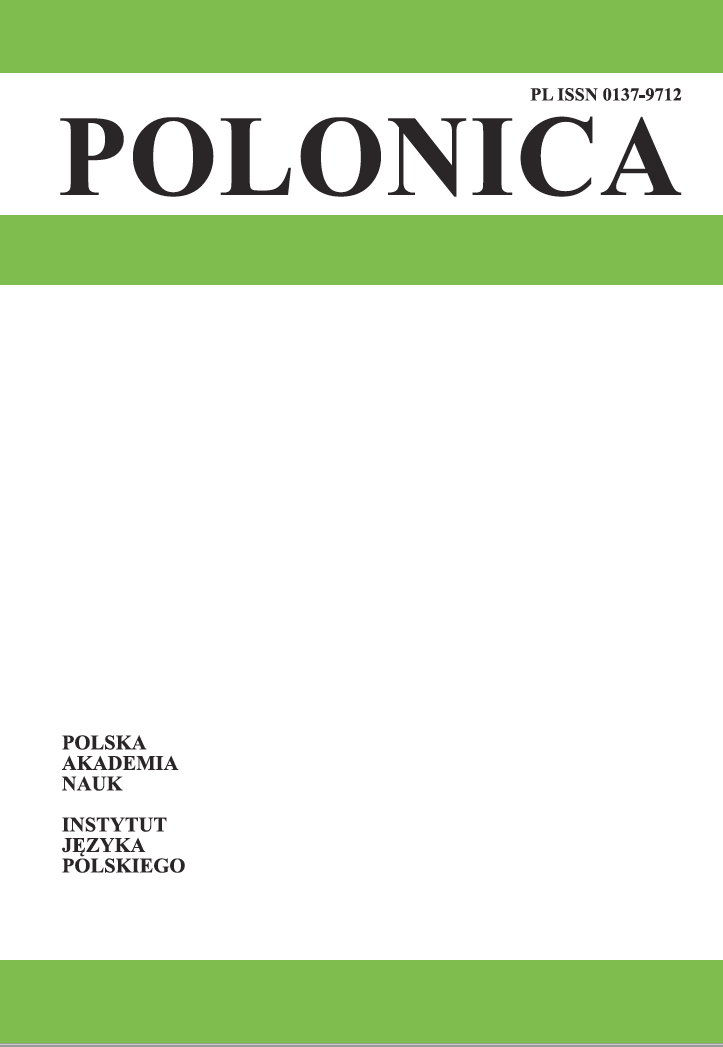Abstrakt
In the present article the object of analysis is the metaphorical representation of concepts- negative values in the Old Polish and Middle Polish periods. In Old Polish and Middle Polish texts abstract concepts are ap-proached in a metaphorical manner, and some source domains recur relatively frequently. Such metaphors are used in reference to concepts which belong to various spheres. The analysis takes into consideration metaphors which are clearly discernible in short fragments, metaphors which are linguistically marked by words semantically associated with the source domain, metaphors which are at the same time in the close vicinity of the lexeme representing a given value and metaphors which recur in texts by various authors. The present article is devoted to metaphorical representations of concepts- negative values in the Old Pol-ish and Middle Polish periods in the category of a disease — a source domain which is drawn taken from the life experience of each person on the basis of attestations which contain the lexeme choroba, niemoc, zaraza [disease, illness, epidemic], and other, e.g.: Co iefliże nas famych one fzkodliwychpożądliwośći choroby trapią (ModrzBaz 67v; SXVI); Grzech ieft zarazą iako morowe powietrze (Starow.Kaz. 1649, s. 330; ESXVII/XVIII). In the early Polish language anti-values — negatively marked concepts which have to do especially with the sphere of morality and social sphere, were embraced by the means of the category of a disease. Due to the development of culture, the changes in the thinking about the world and the changes of the external word itself, of the reality in which man lives, not only did the way the lexemes used in the metaphor a concept is a disease and the frequency of these lexemes change but also the disease itself as a source domain continues to thrive in the Polish language.
Bibliografia
Buława M., 2016, Kulturowe uwarunkowania gwarowych nazw chorób, Polonica XXXVI, s. 259-274.
Kleszczowa K., 1993, „Metafory." w badaniach diachronicznych, Język Polski LXXIII, z. 1, s. 41-48.
Lakoff G., Johnson M., 1988, Metafory w naszym życiu, Warszawa.
Luto-Kamińska A., 2016, Leksykografia historyczna a kompetencja językowa leksykografa, Prace Filologiczne LXVIII, s. 287-302.
Raszewska-Żurek B., 2013, Insza prostota szczera, cnotliwa, przystojna; insza prostota co ją głupstwem zo-wią. O rozwoju jednego ze znaczeń prostoty, Studia z Filologii Polskiej i Słowiańskiej 48, s. 21-42.
— 2016, Metaforyzacja wartości w dawnej polszczyźnie — konwencjonalność ujęć na przykładzie metafory POJĘCIE TO ROŚLINA wyrażonej leksemem korzeń (z derywatami), Polonica XXXVI, s. 77-94.
— 2016, Zgoda w rozumieniu Polaków czasów staro- i średniopolskich (analiza leksykalno-semantycz-na), Warszawa.
— 2017, Metaforyzacja wartości w dawnej polszczyźnie — konwencjonalność ujęć na przykładzie metafory POJĘCIE TO ROŚLINA wyrażonej leksemem kwiat (z derywatami), w druku.
